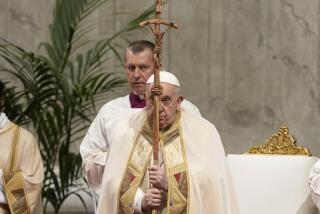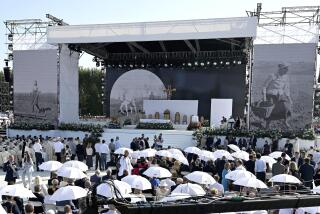When a Faith Exalts Itself Over Others, Hatred Is Born
Two religious words, convent and covenant , are making sad news this summer. Swirling about them is the latest controversy in Jewish-Christian relations.
In the Christian tradition, a convent is a community of nuns who serve God and humankind by living, working and praying together in a cloistered place. Convents exist because Christians consider themselves related to God in a covenant. The essence of that covenant is summed up in Jeremiah’s phrase: “I will be their God, and they shall be my people.”
Possibly no idea has changed human history more than the belief that one’s community has a special, favored relationship to God (or the gods). Christians did not invent it; they inherited the conviction from their Jewish forebears, who understood themselves to be God’s “chosen” people. Christians then went on fatefully to assert that theirs was “the new and everlasting covenant between God and humanity . . . sealed in the blood of Jesus.”
Pope John Paul II used those words in a homily in early August. Long accustomed to such formulas, most Christians found his statement unremarkable. But among Jews, it hit a nerve; they detected an ancient poison that involves allegations about the Jewish people’s “infidelity to God”--also the Pope’s words.
Jewish religion is profoundly sensitive about “infidelity to God.” This sensitivity rightly alerts it to a Christian tendency as destructive as it is old. That propensity is to brand Jews as “infidels,” or worse, because they “fail” to accept what to most Jews is unacceptable: that a “new” covenant, established through Jesus, took the place of the “old,” abrogated the Jews’ status as a chosen people, and, by implication, damned them.
Since the 1960s’ movement toward ecumenism, the relationship between the Vatican and the Jewish people had been improving, only to hit a rocky passage in the reign of Pope John Paul II. Hence, Jewish leaders felt it important to question his pronouncement this month about Jewish “infidelity to God.” They accepted the Vatican’s “clarification,” which no longer used those words. Yet the clarification does not put to rest the deep-seated problem that provoked this latest Jewish-Christian controversy. To see why, turn from covenant to convent.
This path leads to Oswiecim in the Pope’s native Poland. In that place--known better as Auschwitz, its German name--the Nazis took Polish and Christian lives by the hundreds of thousands, Jewish lives by the millions. Today, Auschwitz is nearly synonymous with the Holocaust.
As I can testify from being there this summer, one can visit Auschwitz without seeing, or even knowing, that Polish Carmelite nuns meditate in a red-brick building, once a storehouse for the Cyklon-B used in the gas chambers, at the edge of the camp’s barbed-wire boundaries.
The controversy escalated when a February deadline for relocating the nuns came and went without their departure. It got uglier in July, when Jewish demonstrators took their protest to the convent grounds and Polish workers responded violently. Yet these flash points ought not to obscure a more fundamental problem. Its roots are grounded in rival claims about covenants.
Auschwitz is a tragically fitting place to trace results of that rivalry. What happened there in 1940-45, and in 1989 as well, is bound up with beliefs about God held first by Jews and then by Christians. In particular, the claim that Christianity’s “new” covenant superseded Judaism’s “old” one helped to make the Holocaust happen by fostering a climate of anti-Jewish contempt in which Nazism would flourish.
At their best, religions are indispensable sources of encouragement and hope. At their worst, they give birth to twins, exclusivity and intolerance, that breed vilification and hatred. The remedy is not to eliminate religion, but for a religion to resist the temptation to make its tradition “chosen” to the detriment of others.
The lesson that still needs learning--and by analogy it applies to all faiths, not just to the Jewish and Christian traditions--can be grasped at Auschwitz. When a socially dominant faith exalts itself over the others in its midst, the inference among believers is that they, as people, are exalted. The next twist of logic, that they are free to eliminate the others, is recorded in almost every chapter of human history.
For Jews and Christians, Auschwitz is the paradigm of our time. That a convent’s location should be a matter of controversy indicates the need for a fundamental spiritual reappraisal of love and justice.
More to Read
Sign up for Essential California
The most important California stories and recommendations in your inbox every morning.
You may occasionally receive promotional content from the Los Angeles Times.










